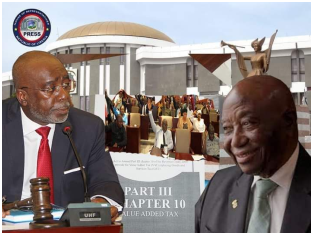By Grace Q. Bryant
The House of Representatives has voted to amend Chapter 10 of the Liberia Revenue Code (LRC).
The plenary’s decision followed a report from its joint committee on Ways, Means & Finance, Judiciary, Public Accounts and Expenditure Thursday, April 25, 2024 during its extraordinary session.
In the statement from the House Press and Public Affairs, the joint committee reviewed a request from President Joseph Boakai, to amend Chapter 10 of the Liberia Revenue Code.
The amendment seeks the adoption of Value-Added Tax (VAT) in replacement of the existing Goods and Services Tax (GST) regime.
According to the President, in 2009, the Liberian government committed, through a memorandum of understanding with the ECOWAS Commission, to adopt VAT.
The approval of the proposed VAT Law will not only fulfill Liberia’s commitment to the regional fiscal integration program but also help to strengthen the overall tax system.
“In particular, the VAT adoption will fix the shortcomings of the GST regime thereby enhancing domestic revenue generation. The current GST is a single-staged sales tax with a narrow base with cascading and pyramiding effects,” he said.
The Liberian Leader said, they have contributed to the inefficiency of the tax as can be seen in its revenue generation when it is compared to regional counterparts.
The President added that, in finalizing the draft law, the government, through the VAT Technical Working Group, collaborated with and sought inputs from, various stakeholders, including local authorities and development partners.
‘For instance, three engagement dialogues were held with local officials from the counties to solicit their inputs into the draft documents – one in Tubmanburg (for officials from Cape Mount, Gbarpolu, and Bomi), one in Gbarnga (for officials from Nimba, Grand Bassa, Rivercess and Bong) and one in Zwedru (for officials from Maryland, Sinoe, Grand Kru, River Gee, and Grand Gedeh),” Pres. Boakai alerted.
President Joseph Boakai said with support from USAID, the team held several engagements with government agencies, civil society organizations, members of the business community, and the Legislature.
A special legislative retreat on the VAT implementation was held in Gbarnga in 2021 while selected members of the House’s Ways Means and Finance Committee formed part of the VAT implementation study tour to Rwanda in 2022.
“Speaker, as already intimated, by the adoption of VAT, the Government of Liberia intends to use it as a catalyst for improving Liberia’s tax system in response to the increasing need to improve tax compliance and hence maximize revenue generation for national development,” Pres. Boakai told the Representatives.
The Liberian leader added that the VAT, as proposed, is a neutral tax; broad-based with minimum exemptions; transparent; and, more importantly, encourages voluntary compliance.
President Boakai said considering the importance of VAT reform in Liberia, “We look forward to the continued support to have the VAT law enacted, which will lead to the generation of additional revenue for the Government of Liberia and; hence, reduce the current fiscal gap.”
Meanwhile, the instrument has been forwarded to the Liberian Senate for concurrence

